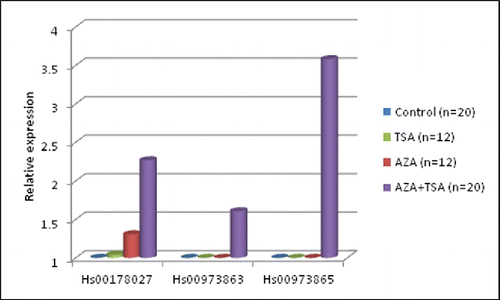Article Title: The recently suggested intestinal cancer stem cell marker DCLK1 is an epigenetic biomarker for colorectal cancer
Authors(s): Hege Marie Vedeld, Rolf I. Skotheim, Ragnhild A. Lothe, and Guro E. Lind
Journal: Epigenetics
Bibliometrics: Published in Volume 9, Issue 3, pages 346–350
DOI: 10.4161/epi.27582
Publisher: Taylor & Francis
In the article listed above the relative expression (ΔΔCt) values and statistics after cell line treatment with epigenetic drugs (AZA, TSA or a combination of both) are incorrect due to a mistake in the processing of the qRT-PCR data. summarizing these data is also incorrect. The correct text and are published below. The correction does not affect the conclusion of the study. The authors apologize for any inconvenience caused.
Figure 3. Relative expression of DCLK1 in cancer cell lines treated with epigenetic drugs. The expression levels are displayed as median fold difference across cell lines treated with TSA (0.5 mM for 12 h; n = 12), AZA (1 mM for 72 h; n = 12) or a combination of both drugs (n = 20) relative to the untreated ones.

The highest fold difference in expression was observed after a combination of both AZA and TSA (Wilcoxon Signed Ranks Test, P < 0.01 for all three assays), but was also significant after treating the cell lines with AZA for the assay covering all three transcript variants (P = 0.016). For the two assays covering only the transcript with a CpG island in the promoter region, there was a tendency for increased expression after AZA treatment, but it did not reach statistical significance (P = 0.125 and P = 0.063, respectively). For TSA alone, no significant effect was seen (Hs00178027, P = 0.078, Hs00973863 and HS00973865, P = 1.000). The negative correlation observed from the cancer cell lines could not be confirmed in a small sample set of colorectal cancers with methylated (n = 40) and unmethylated (n = 10) DCLK1 promoters (Supplementary Figure 1), indicating that promoter hypermethylation is not the primary cause for reduced DCLK1 expression. This is also the case for promoter methylation of VIM, one of the most promising non-invasive biomarkers for early detection of colorectal cancer.9 Although VIM promoter hypermethylation is fairly specific for colorectal tumors, the gene is transcriptionally silent also in the unmethylated normal mucosa.9 Since the highest increase in expression in cancer cell lines was observed after treatment with both AZA and TSA, histone modifications may be another cause for the reduced DCLK1 expression in colorectal cancers.
